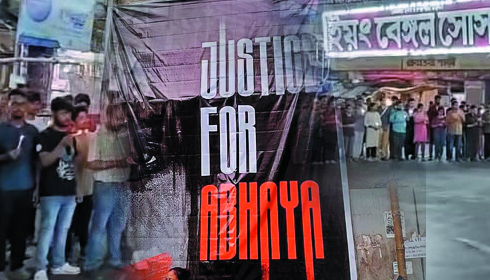
Junior Doctors Call for Transparency and Accountability as Protest in Bengal Hits Deadlock
The long-running stalemate between junior physicians in West Bengal and Chief Minister Mamata Banerjee reached a new stumbling block on Thursday, as the demand for live broadcasting of meetings became a sticking point. Junior physicians have been protesting for almost a month after the RG Kar Hospital tragedy, and they have consistently demanded transparency in conversations with the state administration. However, the refusal to allow live streaming has exacerbated the split, causing havoc in the healthcare industry.
The latest attempt to resolve the crisis occurred after the Home Secretary sent a letter inviting the doctors to meet with the Chief Minister at Nabanna. The invitation, restricting it to 15 delegates and explicitly prohibiting live broadcasting, met with resistance. The younger doctors emphasized transparency, citing mistrust in the state's documentation process, particularly in light of the RG Kar case. As junior doctor Tathagata Das observed, "The meeting could not occur because there was no live streaming." I'm ready to discuss anything. But it must be seen live."
The doctors' scepticism stems from earlier allegations that state organisations mishandled sensitive material, most notably in the RG Kar case. The protesting doctors, with a history of losing crucial papers, say that the lack of live streaming undermines the validity of any agreements or conclusions from these meetings.
Despite the growing tensions, Chief Minister Mamata Banerjee attempted to address the situation in a news briefing, claiming that the Central Bureau of Investigation (CBI) and the Supreme Court are overseeing the larger issue. She clarified that the conversation was being recorded, saying, "I brought my video camera with me so that the whole meeting could be recorded." However, the doctors are still adamant about live broadcasting, claiming a lack of trust in the state's documentation systems.
Chief Justice DY Chandrachud's directive to junior physicians to return to work by September 10 during the Supreme Court hearing on September 9 exacerbated the ongoing protest. However, the doctors have remained staunch in their demands, raising concerns about whether they are violating the court's ruling. Trinamool Congress (TMC) officials, notably Kalyan Banerjee, have stated that the demonstration may constitute contempt of court. "The government is tolerant, yet many people are dying. "The junior doctors must return to work," Banerjee said.
Legal experts such as Bikash Bhattacharya assert that there was no direct violation of the court order. Bhattacharya observed, "Nowhere does the Supreme Court state that young doctors must be at work by 5 p.m. on September 10." The court only said the government could act if they didn't return. This sophisticated legal interpretation has sparked more dispute over the protest's legitimacy.
As the protest continues, the impact on Bengal's healthcare system has been significant. The state administration argues that the absence of young doctors in hospitals has resulted in the loss of 26 lives. While the doctors say their contribution to the broader healthcare system is modest, the Chief Minister expressed serious concern and urged them to return to work immediately. "I forgive the younger doctors, and I want them to go back to work right away so no one else dies," Banerjee stated during her press conference.
Despite these pleadings, the junior physicians resumed their protest outside the Swasthya Bhawan, repeating their demand for livestreaming sessions for the sake of openness. The meeting between the Chief Minister and a few selected representatives fell through because the broader group of protesting doctors refused to participate without live streaming.
The state government plans to present its case at the upcoming Supreme Court hearing on September 17, potentially using the ongoing strike as proof. With lives on the line, political tensions rising, and the state's healthcare system in crisis, the outcome of the next hearing will be vital in determining whether a resolution is possible.
As the Chief Minister expressed her dissatisfaction, stating, "I'm ready to quit, but they don't want the truth," the situation remained precarious. The junior doctors, who are also resolute, continue to demand accountability and show no indications of giving up.